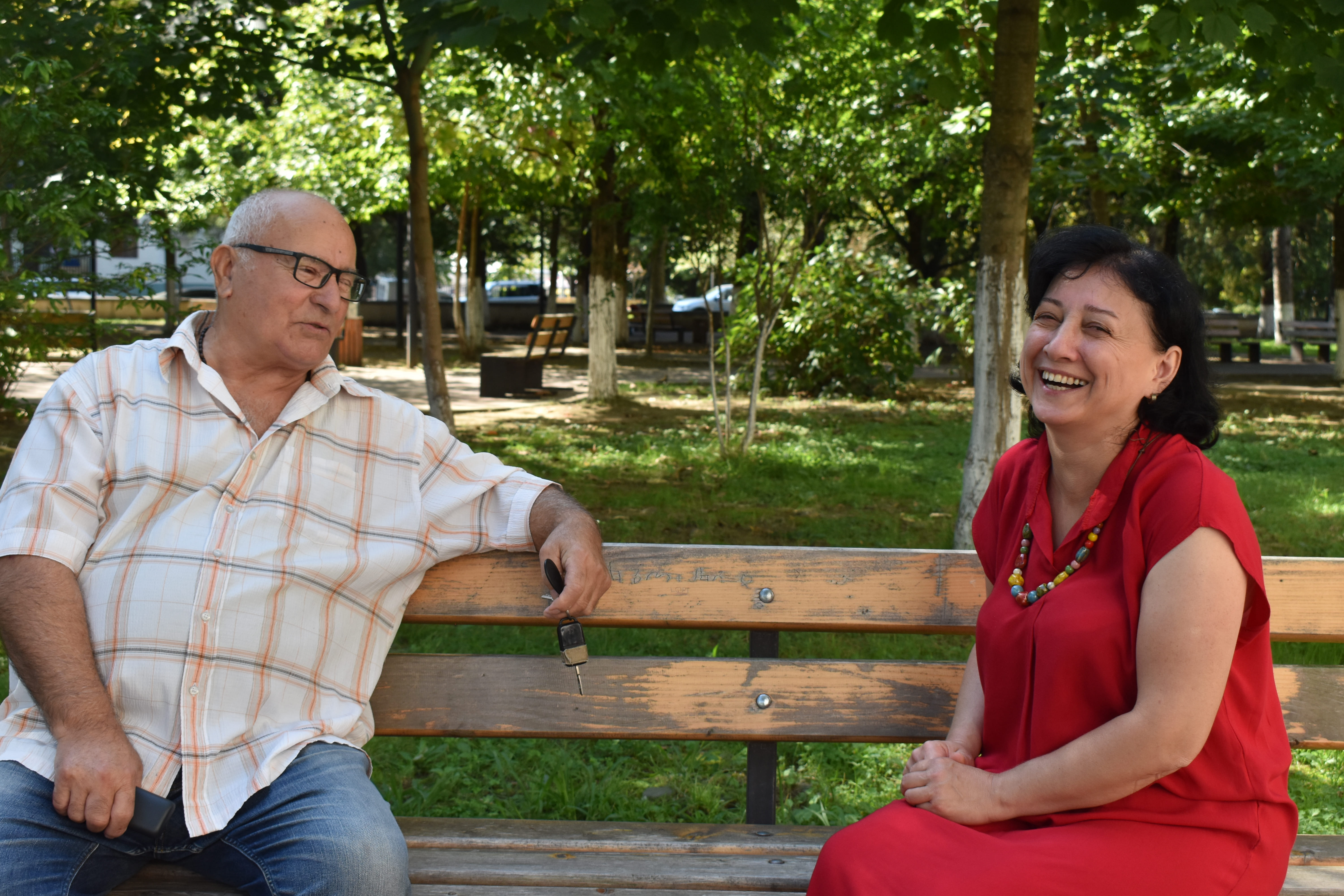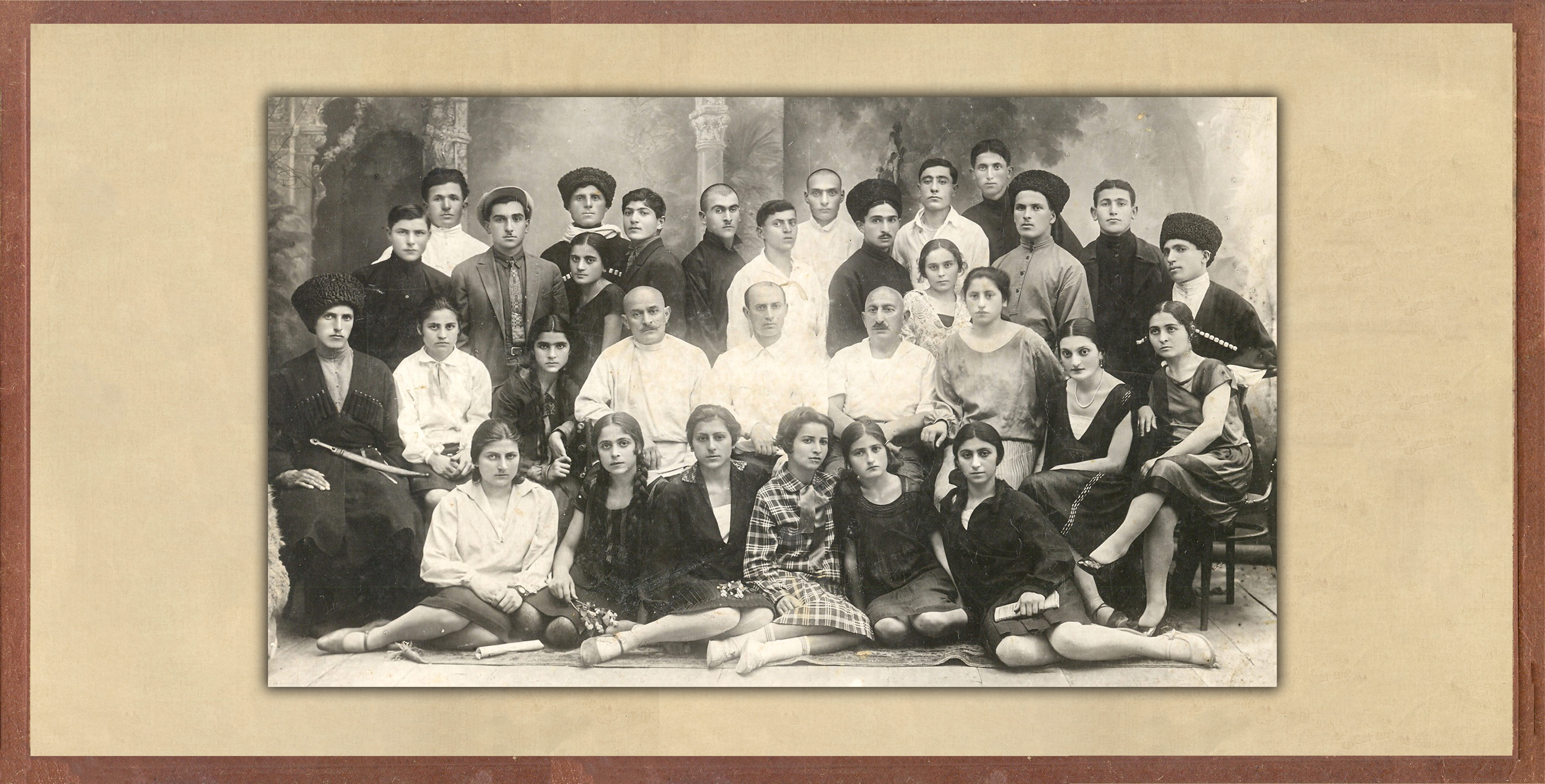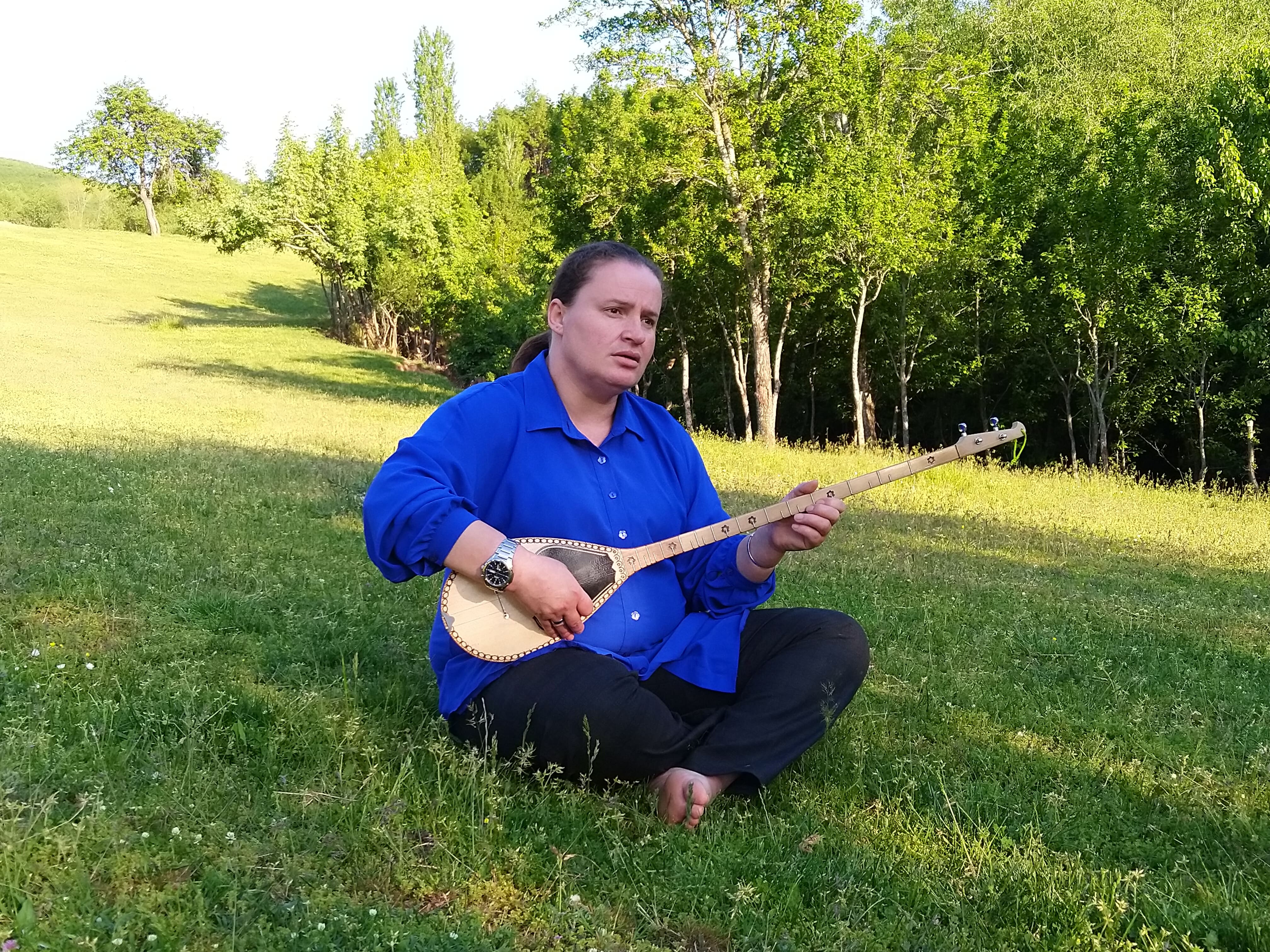Interview with Tristan Sikharulidze
As time goes by, it becomes increasingly rare to encounter a singer who did not learn to sing with sheet music, who still sings in folk tuning (k’ilo), and for whom singing is really a musical conversation and a way to express one’s ideas. One such person is the Gurian singer Tristan Sikharulidze, who learned to sing from his father IlarionSikharulidze—a great singer in his own right—and is close to the roots of Georgian folk singing. Enumerating his accomplishments and awards would take us too long right now, but we will make note of them later on. A conversation with him is like a Gurian song, full of improvisations. Answers to the same question can vary depending on the mood. But the stories and details we learned from the singer during the interview, which we would like to share below, are especially interesting.
Maia Gelashvili: Tristan, during which period of your life did you first encounter music?
Tristan Sikharulidze: That would be the period of my childhood. My father loved guests very much; we had frequent visitors. The table would be set, and during the feast my father would sing different songs with his friends. I was a child then, and these strange and wonderfully interesting tunes hit close to my my heart. I developed a real desire to sing. I must have been five years old when I dared to sing for the first time. Then my father started teaching us. And I had a very talented sister, and my father would sing to us and teach both of us both Gurian songs.
MG: Do you remember your mother’s or grandmother’s singing?
TS: My mother sang very well. I particularly remember a unique “Mravalzhamieri” [a song wishing long life] that she used to sing. She was from the village of Meria, and she knew the “Mravalzhamieri” variant from that village. I remember my grandmother singing “Nana” [a lullaby] to me and scaring off the jackals: “Go to sleep, Nena, go to sleep, don't come, jackal, my boy is sleeping.” She would lower her voice as she sang this. I remember very well when the neighbors had measles. She would dress us in colorful clothes, grab the chonguri, and take us to the sick to sing. She taught us the song “Batonebo” [a healing song for children’s infectious diseases].
MG: You mentioned above that the “strange and interesting tunes” heard in your childhood remained in your heart. Perhaps you also heard k’rimanch’uli [yodeling] and it must have seemed especially strange and amazing to you, right?
TS: Of course. I was amazed and wondered if everyone could do it. But then I had to sing k’rimanch’uli myself. Before I was about to go on stage, [the choirmaster] Misha Shavishvili said to me: “In [ensemble] Shvidkatsa, you should sing k’rimanch’uli.” Later, Anzor Erkomaishvili invited us to collaborate with ensemble Rustavi, and we recorded some songs together. Two of the songs, “Adila Alipasha” and “Shvidk’atsa”, feature my k’rimanch’uli. It was sometime in the ’80s.[1]
MG: You have mentioned song masters of different generations with whom you had a professional relationship, though your first musical experiences were with your father and your family. Who did your father learn to sing from?
TS: I can confidently say that Artem Erkomaishvili was my father’s teacher. My father’s father did not sing. The singing tradition in our family begins with my father and uncle. There were two brothers, Ilarion and Ippolite, and both had extraordinary talent. My father mainly sang the first and second voice, and his brother Ippolite sang the bani [bass]. My uncle was in Varlam Simonishvili’s ensemble for a while. Then he was drafted into the army and never returned.
MG: What was your father like as a teacher?
TS: He opened the door to the world of Gurian singing and taught me how to think musically, but my father did not teach me all the songs. I listened to the recordings by Artem Erkomaishvili, Samuel Chavleishvili, Vladimer Berdzenishvili, and absorbed the best. I remember on one occasion, when I performed “Kalos Khelkhvavi” with an ensemble, Misha Shavishvili and Giorgi Salukvadze were in the jury, and singer Kote Papava saw me at the door and said to me: “Son of Ilarion, is this how your father taught you to sing this song?” There were some people there, so I pulled him aside and sang Varlam Simonishvili’s variant. Then he said to me: “So you do know this song, but why did you sing it differently?” Varlam was like a god to everyone, and you wouldn’t usually stray from his variants. My father was like that too. I knew all the variants and wanted to sing my own.
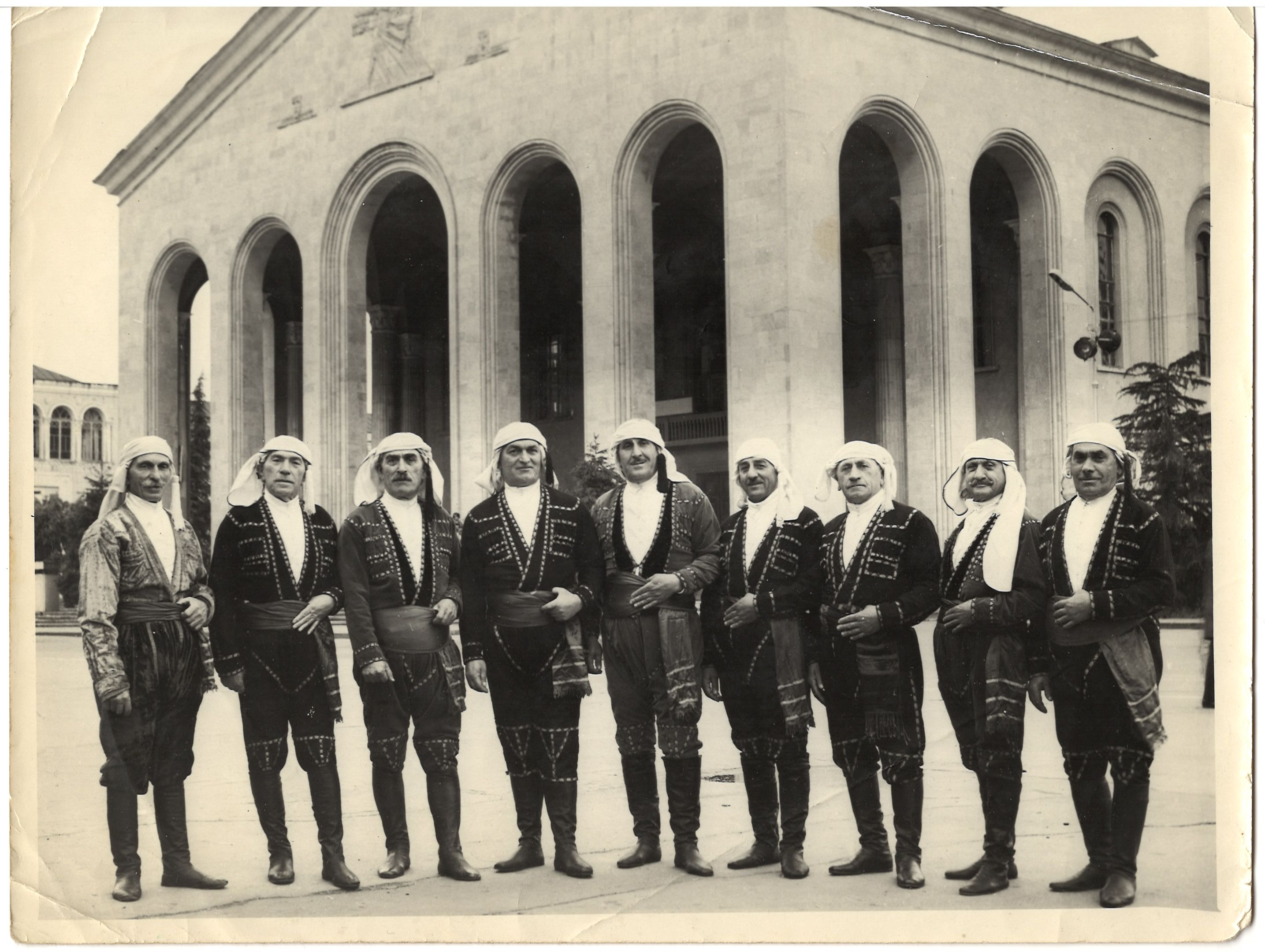
First from right to left – Ilarion Sikharulidze
MG: Given such a wealth of experience, which school of Gurian singers do you like?
TS: They were all the best. How can I say something bad about Vladimer Berdzenishvili, or about Varlam Simonishvili? However, for me Artem Erkomaishvili stood out.
MG: There was a time when you and your father sang together. Did you think you were well-matched in song?
TS: Yes, there was a period when we sang together. Artem Erkomaishvili first taught me in the village choir, and then he was appointed choir master at the Ozurgeti House of Culture. My father, myself, and my sister used to sing with him. But my father was beyond me: he knew more songs and he took a lot with him when he passed away. He was also an extraordinary singer. They had a trio in the ensemble: my father, Domenti Karchava, and Shermadin Chkuaseli. My father and Domenti used to switch off singing first and second voice. Shermadin was always the bani.
MG: What was his teaching method?
TS: Exactly the same as the one I use now. He would divide the song into sections. First, he would teach the first and second voices, then the bani. Then all three voices would sing together and then move on to teaching a next section. This is exactly how I taught my children and students. My grandchildren also know Gurian songs very well. I have a little great-grandchild, who I really hope will continue the family tradition of singing.
MG: What does Gurian singing mean to you?
TS: It is my lifeblood, I can’t live without it. Even in times of trouble—may God save us all— when there are difficult days, I hum something, and it helps me. Singing also got me into society, connected me with a community. If it wasn’t for song and if I were not a singer, I wouldn't have lived this long. It was the same for my father.
MG: Do you see this attitude towards singing in anyone from the next generations of your family?
TS: I see it in one of my grandchildren, who is an actress—she is my daughter’s daughter, Ana Kurtubadze. She sings Gurian songs exceptionally well. And I have high hopes for her little one.
MG: Your longest partner in song was your cousin Guri Sikharulidze, right?
TS: My cousin Guri was a great singer. I could not find a replacement for him. With the advice of Anzor— Anzor Erkomaishvili, that is—we created the trio Shalva Chemo, which soon made a name for itself, and we were invited to perform everywhere. Singing with Guri was never difficult, and you would never be intimidated. No matter where you started the song, he would get it, and immediately pick it up. He was a good person and a very, very good singer. Anzor always used to say, “When I go to Guria, I am happy. Guri and Tristan will meet me there, and singing with them is a great pleasure.”
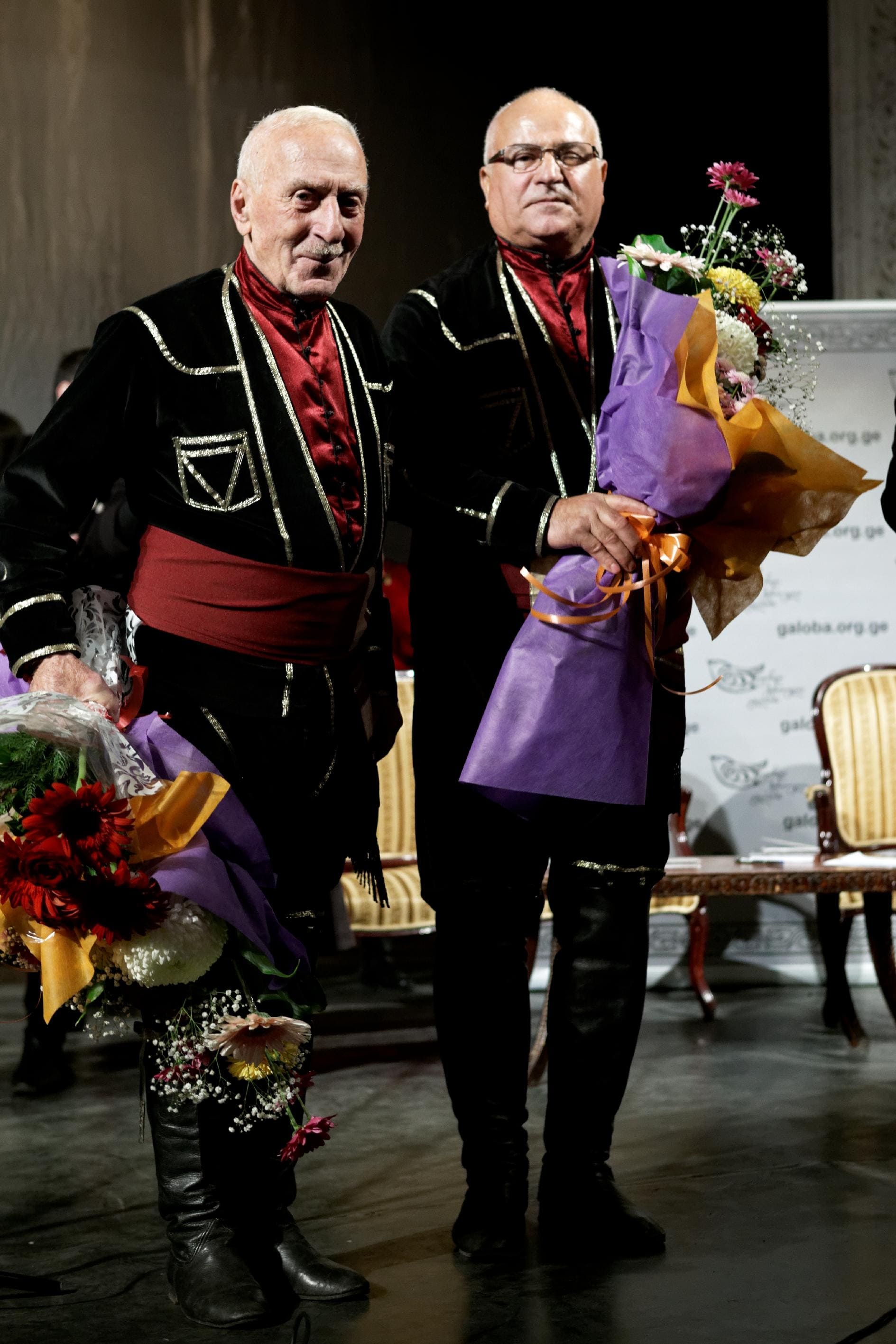
Guri and Tristan Sikharulidze
MG: Have you trusted all these songs to memory alone? Did you ever write the lyrics on paper or use any notation?
TS: I didn't need anything except my mind and memory. I was also surprised, by the way. Once Anzor asked me to write down the songs I knew. I started to make a list, and when I reached 120, I started going over them. I was surprised at how so many songs fit in my head, so many variants for each song, and all three voices. If you rely on sheet notation, it is like having a “stamped” version: if a singer falters, you lose your way. That’s why I never had an instance of a song “falling apart.” This is probably the result of the development of musical thinking.
With Guri, we never sang in a pre-determined way: when Guri took the melody up, you had to follow him. And the bani couldn’t just stay where it was, so it would follow us too. All of a sudden, the top voices would start rolling down, and the bani must follow. Rebuli Mzhavanadze is another good song partner like this.
MG: In which ensembles have you sung?
TS: In the Makvaneti village choir with Artem Erkomaishvili, in the Ozurgeti House of Culture ensemble with Vladimir Erkomaishvili, then I was invited to join the Georgian state ensemble under Grigol Chkhikvadze. But I soon returned [to Guria]. In 1966, Mikheil Shavishvili invited me to join Shvidkatsa, and I am still in this ensemble.
MG: You have sung in choirs, large ensembles, and a trio. What is your preferred configuration for singing?
TS: In a trio, of course. You sing more easily if you have good singers and you listen to each other and are in tune with each other.
MG: What singers from the old generation would you like to sing with?
TS: I used to answer this question like this: with Samuel Chavleshvili and Vladimer Berdzenishvili. But now my Anzor and Guri are gone, too, and I miss singing with them.
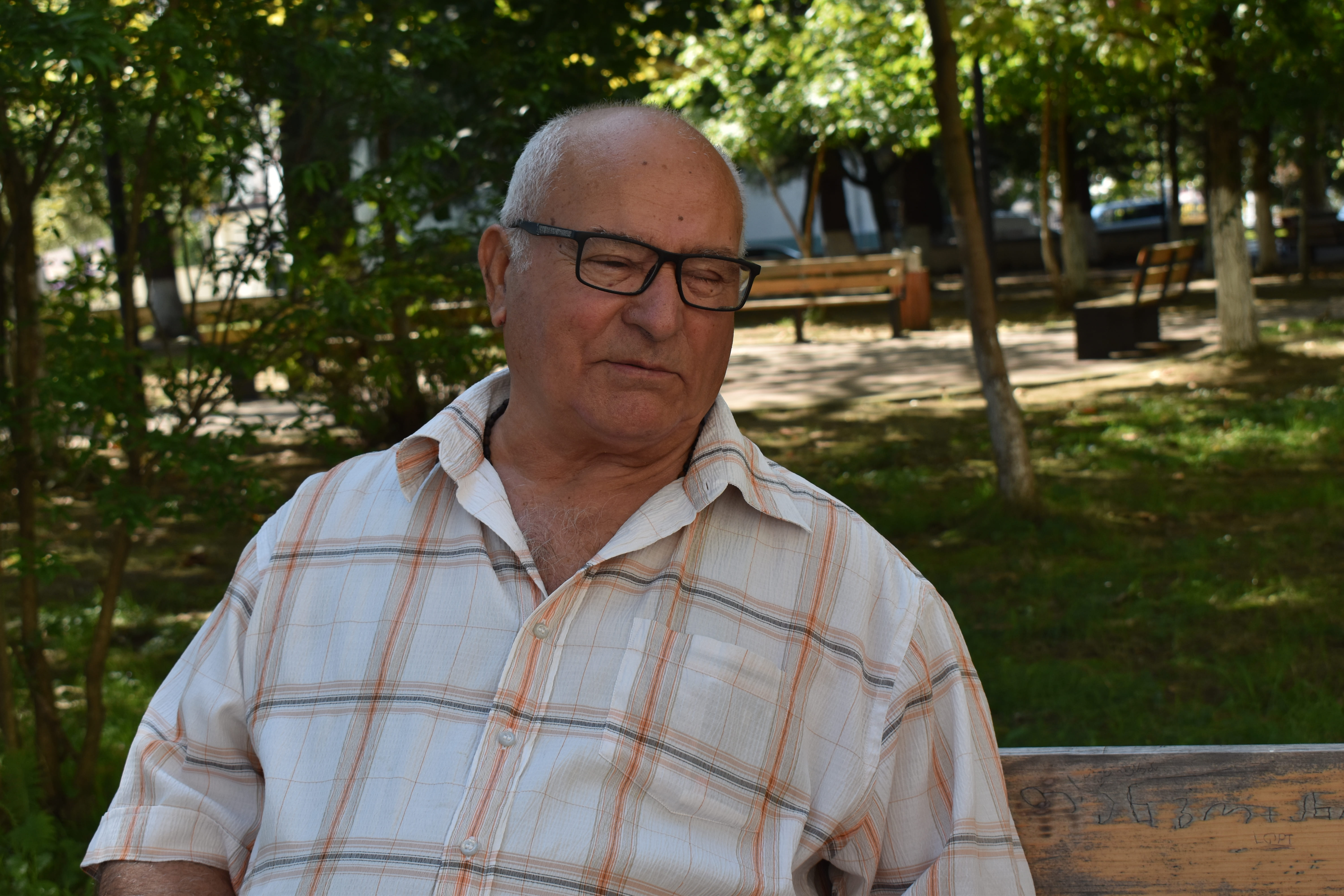
MG: When you talk about Anzor Erkomaishvili, what comes to mind?
TS: Talking about Anzor would take us far, far away. I should especially mention his humanity. If it wasn’t for him, Gurian song and Georgian folklore in general wouldn’t be as strong as they are now. Anzor and I grew up together. He was three years younger than me. In 1947, when he was seven years old, and I was ten, a children's ensemble was formed in Ozurgeti for the National Olympiad. Children with the best ear and voice were selected from among the students of different schools. Anzor and I from Makvaneti had to participate. Anzor’s mother Eteri would hold our hands and we would walk to the rehearsals in the city. Vladimer Erkomaishvili was the head of the ensemble. When the Olympiad were scheduled to happen, we arrived in Tbilisi and they took us to the opera theater for a trial run. The next day they brought us up onto the stage. Anzor was so small that they had to put him on a chair. When the curtain opened, instead of an empty hall, we saw a mountain of heads. [laughs] I started “Shvidkatsa,” Anzor sang k’rimanch’uli, and Ms. Vashalomidze sang bani. When we finished the song, I thought the hall had collapsed. We got scared and ran away from the stage. They brought us back on stage and presented us with wristwatches. When he grew up, Anzor left for the city, and I stayed in the village.
Anzor created the Rustavi Ensemble at the same time as when I was singing in the state ensemble. I was invited to record some songs as a specialist in Gurian singing, and we recorded twenty-five songs together. The record was called 100 Georgian Folk Songs. We had a great friendship. There was no chance of him coming to Guria and us not seeing each other. Anzor also wrote a book about me and Guri. He invited us to his country house in the village of Misaktsieli. We talked, told different stories, and he wrote them down. Anzor’s passing caused me great pain. He has done so much work in this field, that Georgian folklore will not diminish.
MG: Could you mention the recordings that stand out to you and that you consider particularly important in this field?
TS: The most important was a project that set out to record folk songs from different regions, performed by singers of the old generation, financed by the Georgian Chanting foundation. This was a project of Ensemble Basiani and its leader Giorgi Donadze, “Unik’aluri chanats’erebi” [unique recordings”]. For this purpose, eighty-nine-year-old Polikarpe Khubulava was invited from Samegrelo, and me, Guri, and Merab Kalandadze from Guria. Ensemble Basiani and Anzor himself also participated. It includes Gurian and Megrelian songs, as well as songs from different regions sung by Ensemble Basiani.
MG: Can you pick the top five Gurian singers? Who would you name?
TS: Samuel Chavleshvili, Artem Erkomaishvili, Varlam Simonishvili, Vladimer Berdzenishvili and Teopile Lomtatidze. I have sung with all of them, except Samuel Chavleishvili and Teopile Lomtatidze. If you’d given me a bigger number, that would’ve been better [laughs]—there are so many good singers.
MG: Who are the most promising singers of the new generation?
TS: The teachers and students of the Choirmaster School have instilled great hope in me. In my opinion, Gurian song will not be lost because our students are already a great force. Their teachers—Lasha Chkhartishvili, Mamuka Siradze, Mamuka Rusidze, and Potine Gordeladze—are extraordinary teachers. I am not saying this to blow my own horn, but Lasha Chkhartishvili, and Mamuka Siradze, along with Guram Guntadze, were my students, and they are closer to the folk roots.
MG: You mentioned students, and what would you say after listening to the k’rimanch’uli of Nini Makharadze, a student at the Ozurgeti Choirmaster School? Historically, the attitude of Gurian singers towards female mok’rimanch’ule [yodelers] has been rather negative.
TS: It’s very good of you to mention this and to ask about it. In the old days, they wouldn’t let women sing k’rimanch’uli. They would say, “Have you ever seen a hen crow?” This thinking was dispelled in me after listening to Zhenia Shavishvili. She had such a voice and technique that you couldn't distinguish it from a man’s. As for Nini, I am pleasantly surprised. I think that she will be one of the stronger k’rimanch’uli singers in Guria.
MG: What do you think about naduri [work songs] being sung by women? Is it acceptable for you if women sing with big, strong voices?
TS: The women's ensemble Atsaura from Lanchkhuti performs a women's naduri, but that song does not have a particularly persistent and tiring k’rimanch’uli part. Men’s naduri require a lot of energy, and for women they could be a bit tricky and difficult to sing.
MG: Besides singing, you have other talents. You can speak in verse very well.
TS: Against my will. I wouldn’t count that as anything. Maybe as a joke, a few poetic lines in response to someone. But then, little by little, I come up with something. The heartbreak I felt after Anzor's death especially moved me.
MG: Another talent of yours is acting.
TS: This really worked out for me. I didn't even practice. I was in the movie Knights of Georgian Chant [Galobis raindebi, 2010]. Guri, Merab Kalandadze, and I play chanters. I portray [Ermile] Molarishvili, Guri is Anton Dumbadze, and Merab is Nestor Kontridze. In the other film “Moparuli Simghera” (Stolen song), Eldar Shengelaia cast me alongside Imedo Kakhiani. They told me what to say and we recorded it successfully in one take.
MG: Do you play any instruments?
TS: I play the chonguri and panduri. It’s too bad that I can’t read notation. Maybe it would help me to record my own songs. I would sometimes get a new melody in my head—but where’s the time for that now?
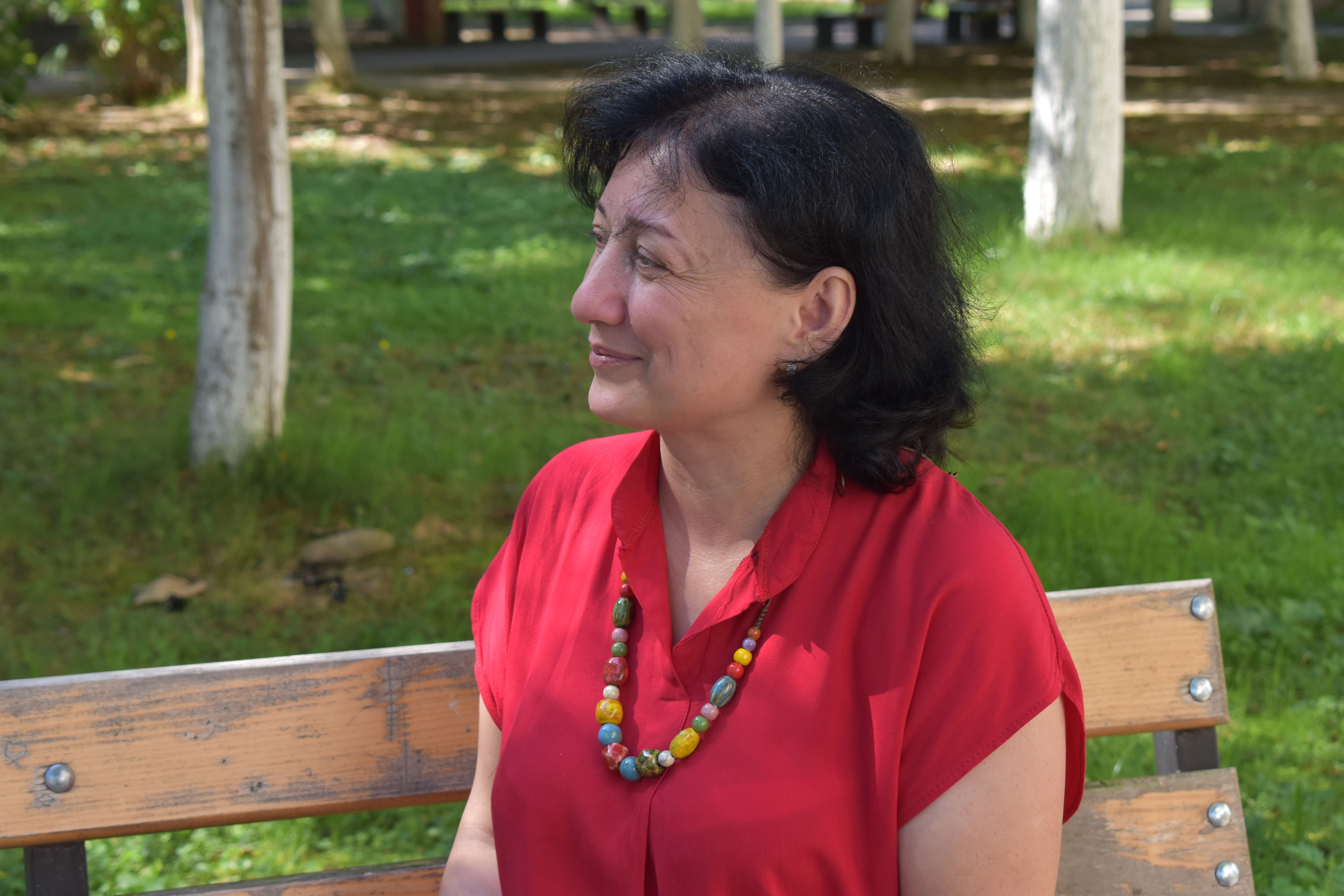
MG: Can you imagine what Gurian song might be like one hundred years from now?
TS: With this new generation, Gurian songs will not be lost; they will make it stronger with their might. If they create something new, they should find their own way, not copy other people's work. It might be hard to imagine that an innovator like Chavleishvili could be born in Georgia nowadays, but if there is one, we should not compare them to Samuel Chavleishvili.
MG: What is the standard to which you hold other people?
TS: You should be kind and forgiving. I got a lot of heartache from people, but I got over my anger and am rewarded with the fact that I don't have enemies anymore. Even if someone is very talented as a singer, but is no good as a person, I don't want anything to do with them—they’re as good as a gramophone. Our great choirmaster and singer Artem Erkomaishvili had a good rule of thumb: a singer is only good when he is also a good human. Otherwise, he’s worth no more than a penny.
MG: What breaks your heart?
TS: I didn't manage to learn all the songs I could have learned from my father. I am also not able to fully transmit all my knowledge to the students. Learning from a recording cannot compare to the live teaching experience.
MG: You are the recipient of numerous awards and certificates of honor, an outstanding choir master, a consultant at the Ozurgeti Choirmaster School. You have the honorable titles of “Patron of Folk Song” [khalkhuri simgheris moamage], ”Practitioner of the Arts” [khelovnebis kurumi], you have been awarded a gold statuette of the Bird of Gratitude. Which award is the most valuable to you?
TS: When I turned eighty-five, great birthday celebrations and concerts in my honor were organized in Ozurgeti and Tbilisi, and they gave me such great love and warmth that I really did not expect. The love of your people—there is no greater recognition and reward than this. For my part, as long as I live, I will give this work everything I have.
MG: Thank you very much for the interview. I wish you long life and long singing.
TS: Thank you, and thank you to my people for their love.
[1] These recordings appear on the album 100 Georgian Folk Songs (Asi kartuli khalkhuri simghera), released by the Rustavi Ensemble in 1989: https://records.su/album/25554.
